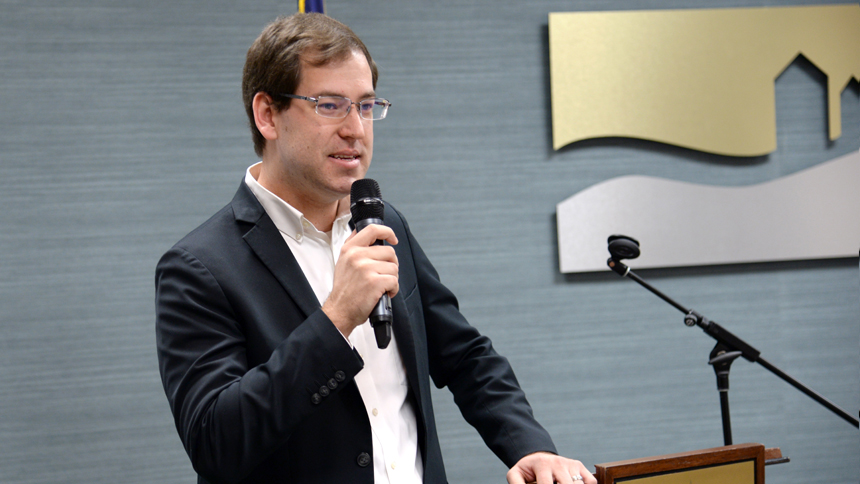Springfield-Area Representative Provides Updates on the Legislative Session and Efforts to Improve the Business Climate

State Representative Alex Riley visited the Chamber on February 3 to provide an update on this year’s legislative session and insight on priorities currently moving through the legislative process.
Riley represents parts of Greene County in the Missouri House of Representatives, including a portion of southern Springfield and Battlefield. During his three years of elected service, Riley has focused on several issues important to the business community, including regulatory and tort reform, strategic budget investments, addressing poverty through economic development support, removing workforce barriers, and more. In 2022, Riley successfully championed several funding appropriations for Springfield-area organizations and a tax cut for small businesses, among other efforts.
For the 2023 legislative session, which began in early January, Riley highlighted that legislation is moving quickly in the Senate. This is a welcome change from the gridlock frequently experienced in the upper chamber last year. However, the process is still designed to move slowly, which Riley notes is beneficial for Missourians.
“It should be hard to pass a law and it’s good the system is messy,” he explained, as the legislative process is designed to weed out potentially harmful bills.
Riley’s philosophy around the legislative process extends into how he approaches public service. This includes his collaborative spirit with his colleagues, both within his party and across the aisle.
Early in session, Riley was tasked with chairing a committee hearing that included reviewing several controversial bills, where he knew there would be a significant amount of public testimony and likely heightened emotions.
“You cannot always control what bills are put on your desk,” Riley said. “But I knew I wanted to provide a fair process for everyone to be heard.”
Riley worked closely with Democrat colleagues to establish a transparent and fair process that committee members and citizens felt allowed for public engagement.
Although this process resulted in a committee meeting that lasted over nine hours, the guidelines set in place resulted in both sides of the issue getting a chance to be heard in Jefferson City, a fact Riley was proud of.
In addition to process improvements, Rep. Riley has prioritized reducing the barriers for people in the workforce. This includes a hearing this week on a medical licensing issue that will reduce barriers for trained professionals moving to Missouri. This will allow those who had similar training and the license and ability to perform certain procedures in another state to practice in Missouri. Representative Riley believes this license reciprocity will help reduce the cost of care and expand access.
The House of Representatives is also focusing on addressing several crime and public safety-related proposals. Riley currently sits on the House Committee for Crime Prevention and Public Safety and mentioned that crime issues are impacting all areas of the state, as high crime rates, even if just in specific cities, dissuade new industries and businesses from expanding to Missouri. Since his update to Chamber members, the Missouri House gave approval to HB 301, which provides a mechanism for the attorney general to prosecute crimes in St. Louis, and is being considered by the Senate.
Outside of public safety, both the House and Senate have prioritized improving the initiative reform process through several proposals that would require approval from Missouri voters before implementation. The Springfield Chamber has been a long-standing supporter of finding the balance between allowing citizens the opportunity to engage in the process and protecting our state’s constitution from being permanently amended with faulty, complex or confusing language.
Several business leaders in attendance thanked Representative Riley for his efforts of their behalf, acknowledging his hard work to address shared priorities during his short tenure in the House.

